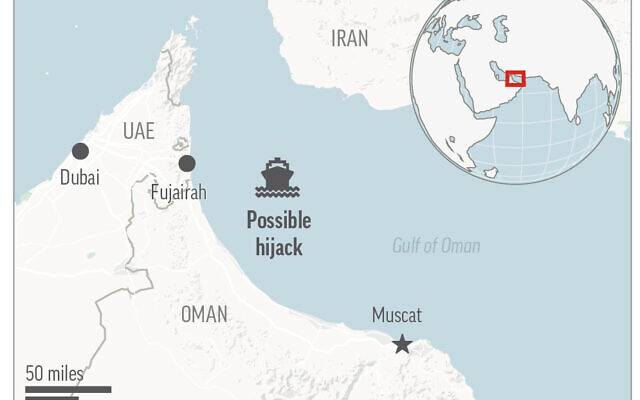Military says ‘incident complete’ after reports of armed men commandeering ship near UAE; details surrounding episode remain unclear
The British navy says the hijackers who boarded a vessel off the coast of the United Arab Emirates in the Gulf of Oman have left the targeted ship, without elaborating.
The notice on Wednesday came after the British military’s United Kingdom Maritime Trade Operations warned of a “potential hijack” under unclear circumstances underway the night before. The group reported that the “incident [is] complete.” It did not provide further details.
According to the Reuters news agency, which quoted two security maritime sources, Iranian-backed forces were believed to have seized the tanker.
Shipping authority Lloyd’s List and maritime intelligence firm Dryad Global had both identified the seized vessel as Panama-flagged asphalt tanker Asphalt Princess. The ship had been heading toward Iran under the control of armed men with British and US naval operations monitoring the situation, Lloyd’s List said.
Richard Meade, editor of the shipping industry intelligence site, had told the UK’s Times that armed forces “boarded the vessel, which last signaled its position around 5 p.m. London time, and are directing it towards Iran,” before the ship was eventually released.
The vessel’s owner, listed as Emirati free zone-based Glory International, could not immediately be reached for comment.
The event unfolded amid heightened tensions between Iran and the West over Tehran’s tattered nuclear deal with world powers and as commercial shipping in the region has found itself caught in the crosshairs. Most recently, the US, the UK and Israel have blamed Iran for a drone attack on an oil tanker off the coast of Oman that killed two people last Thursday. Iran has denied involvement.
On Tuesday evening at least six ships off the coast of the United Arab Emirates broadcast warnings that they had lost control of their steering under unclear circumstances.
Abolfazl Shekarchi, Iran’s senior armed forces spokesman, denounced reports of maritime incidents and hijacking in the Gulf area as “a kind of psychological warfare and setting the stage for new bouts of adventurism,” Reuters reported, citing the Fars News Agency said.

Apparently responding to the incident, Iran’s state-run IRNA news agency quoted Foreign Ministry spokesman Saeed Khatibzadeh as calling the recent maritime attacks in the region “completely suspicious.” He denied that Iran was involved.
“Iran’s naval forces are ready for help and rescue in the region,” Khatibzadeh said.
The United States stopped short of assigning blame for the latest episode but State Department spokesman Ned Price said there has been “a very disturbing pattern of belligerence from Iran.”
“When it comes to this specific incident, it’s too early for us to offer a judgment just yet,” Price told reporters.
The event comes just days after a drone struck an oil tanker linked to an Israeli billionaire off the coast of Oman, killing two crew members. The West blamed Iran for the attack, which marked the first known assault to have killed civilians in the yearslong shadow war targeting commercial vessels in the region.
Iran denied playing any role in the incident, though Tehran and its allied militias have used similar “suicide” drones in attacks previously.
Israel, the United States and the United Kingdom vowed a “collective response” to the attack, without elaborating.
The Gulf of Oman is near the Strait of Hormuz, the narrow mouth of the Persian Gulf through which a fifth of all oil passes. Fujairah, on the UAE’s eastern coast, is a main port in the region for ships to take on new oil cargo, pick up supplies or trade out crew.
For the past two years, after then-President Donald Trump withdrew the US from Iran’s nuclear deal and imposed crushing sanctions on the country, the waters off Fujairah have seen a series of explosions and hijackings. The US Navy blamed Iran for a series of limpet mine attacks on vessels that damaged tankers.
In the summer of 2019, Iran’s Revolutionary Guard troops detained a British-flagged tanker, the Stena Impero, near the Strait of Hormuz — a raid that came after Britain seized an Iranian tanker off the coast of Gibraltar on suspicion the ship had been headed to Syria in violation of European Union sanctions.
Last year, an oil tanker sought by the US for allegedly circumventing sanctions on Iran was hijacked off the Emirati coast and later ended up in Iran, though Tehran never acknowledged the incident.
And in January, armed Iranian Revolutionary Guard troops stormed a South Korean tanker and forced the ship to change course and travel to Iran. While Iran claimed it detained the ship over pollution concerns, it appeared to link the seizure to negotiations over billions of dollars in Iranian assets frozen in South Korean banks.
 Eurasia Press & News
Eurasia Press & News



